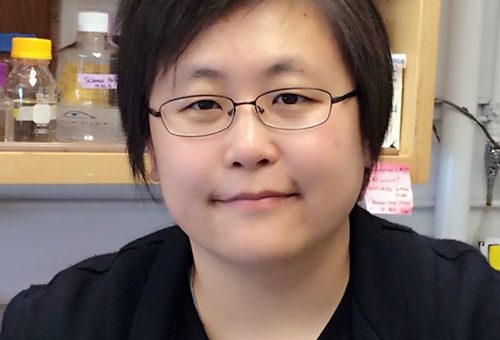
Dr Yiliang Ding and her group have been awarded European funding to take forward their field-leading research into the structure of RNA.
Dr Ding, a group leader at the John Innes Centre receives the European Research Council (ERC) consolidator grant, worth nearly €2 million, over a period of 5 years.
In receiving the funding Dr Ding becomes one of 321 elite researchers to benefit from the €657m grant distribution made as part of the EU's Horizon Europe programme in 2023.
"This is a genuinely blue sky, high-risk, high-gain interdisciplinary programme with the potential to provide a breakthrough in understanding at the leading edge of the international RNA biology field," said Dr Ding.
The grant will fund a project named Venture which will investigate the role that RNA structure plays in messenger RNA (mRNA) export, that is the movement of information-carrying molecules from the cell nucleus to the cytoplasm, where proteins are made.
Understanding this fundamental biological process better may provide opportunities for plant, animal and human health.
RNA stands for Ribonucleic Acid and is an important molecule throughout all life, from single-celled microorganisms to plants and humans.
The Ding group has pioneered research into RNA, developing a technique known as SHAPE, which allows the structures of RNA to be captured in living plant cells. RNA has long been characterised as skinny or single-stranded. But there is a growing body of knowledge which shows that this molecule can fold itself into complex structures which determine a range of biological functions.
"This exciting research programme will harness state-of-the-art multi-disciplinary methods to comprehensively investigate functional roles for RNA structure in RNA export," said Dr Ding. "The potential biological function of mRNA export in regulating cell identity in our work will, for the first time, shed light on our understanding of this remarkable evolutionary nucleus-cytoplasm compartmentalization. Both novel technologies and new frameworks from this work will have the potential for translation to a broad range of organisms."
The award is Dr Ding's third ERC grant and follows an ERC Starting grant, and a Proof-of-Concept grant in 2021.
Consolidator grants are designed to assist excellent scientists who have 7 to 12 years' experience after their PhDs, to pursue their most promising ideas. Previous John Innes Centre awardees include Professor Cristobal Uauy.
President of the European Research Council Prof. Maria Leptin said: "ERC Consolidator grants support researchers at a crucial time of their careers, strengthening their independence, reinforcing their teams and helping them establish themselves as leaders in their fields. And this backing gives them a chance to pursue their scientific dreams."
Grant winners will carry out their projects at universities and research centres in 18 EU Member States, plus other countries associated with Horizon Europe. The grants will create around 1950 jobs for postdoctoral fellows, PhD students, and other staff at the host institutions.
The Trade and Cooperation Agreement between the European Union and the United Kingdom allows for associating the UK to the current EU research and innovation funding programme, Horizon Europe, subject to the adoption of a Protocol.
The ERC offers four core grant schemes: Starting Grants, Consolidator Grants, Advanced Grants and Synergy Grants. With its additional Proof of Concept Grant scheme, the ERC helps grantees to bridge the gap between their pioneering research and early phases of its commercialisation.






